Understanding User Queries to Boost Your Off-Page SEO
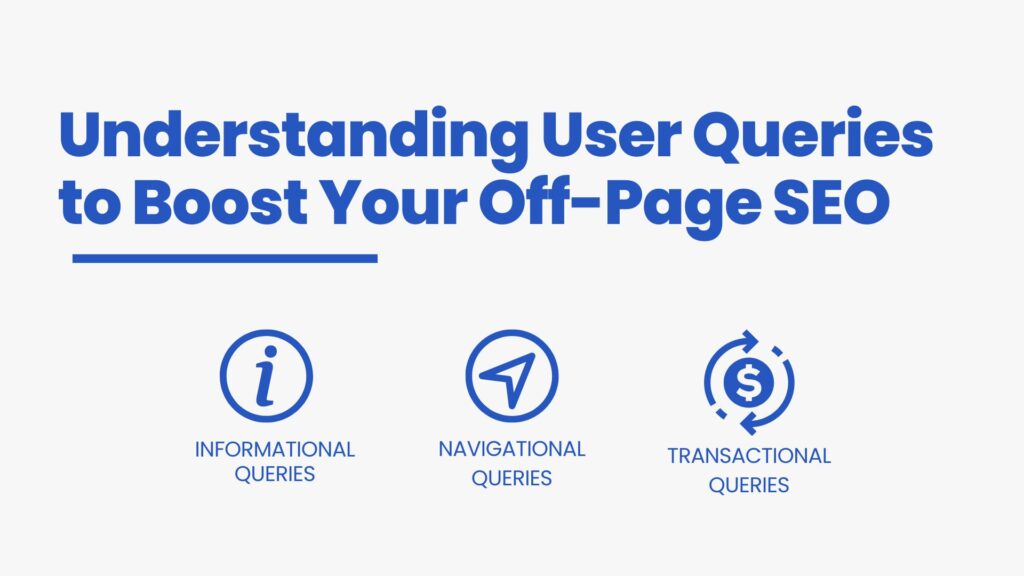
When it comes to improving your website’s search engine ranking, most people focus on on-page SEO tactics like optimizing keywords, creating engaging content, and improving site speed. However, off-page SEO—what happens outside your website—is just as important. A critical part of off-page SEO success involves understanding user queries, or the questions and phrases people type into search engines.
Let’s explore how understanding user queries can improve your off-page SEO efforts, why it matters, and practical ways to align your strategies with user intent.
In this article:
- What Are User Queries?
- Why Understanding User Queries Matters for Off-Page SEO
- Types of User Queries and Their Role in Off-Page SEO
- How to Align Off-Page SEO Strategies with User Queries
- Benefits of Aligning Off-Page SEO with User Queries
What Are User Queries?
A user query is the term, question, or phrase someone types into a search engine like Google. These queries reveal what people are looking for online and provide clues about their intent.
For example:
- Informational Query: “How to bake a chocolate cake”
- Navigational Query: “Facebook login”
- Transactional Query: “Gaming laptops under $1000”
Understanding the types of queries people are using can help you create and promote the right content, driving relevant traffic to your site and improving your off-page SEO strategies.
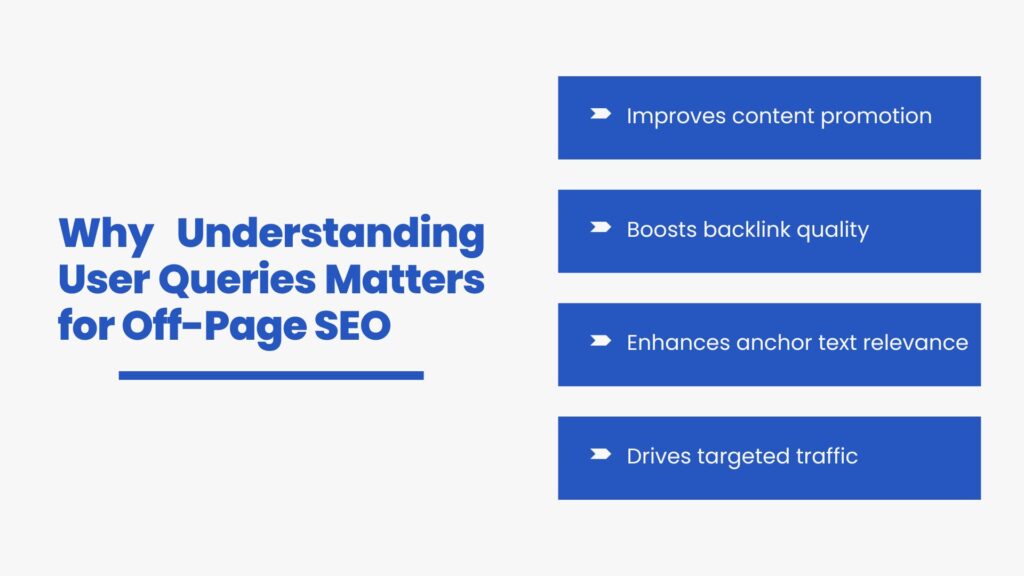
Why Understanding User Queries Matters for Off-Page SEO
Off-page SEO isn’t just about building backlinks—it’s about creating a strong online presence that attracts users and search engines. Here’s how understanding user queries helps:
1. Improves Content Promotion
When you know what your audience is searching for, you can create content that directly answers their queries. This makes your content more shareable and relevant and increases the chances of earning backlinks from other sites.
2. Boosts Backlink Quality
Backlinks from reputable websites are crucial for off-page SEO. When your content aligns with user queries, it’s more likely to be linked by authoritative sites because it provides value.
3. Enhances Anchor Text Relevance
Anchor text—the clickable words used in backlinks—affects your SEO. By understanding user queries, you can encourage relevant anchor text and url slug that aligns with the keywords users are searching for.
4. Drives Targeted Traffic
When your content matches user queries, the backlinks you earn are more likely to drive relevant traffic to your site. This can increase user engagement, reduce bounce rates, and improve your overall SEO performance.
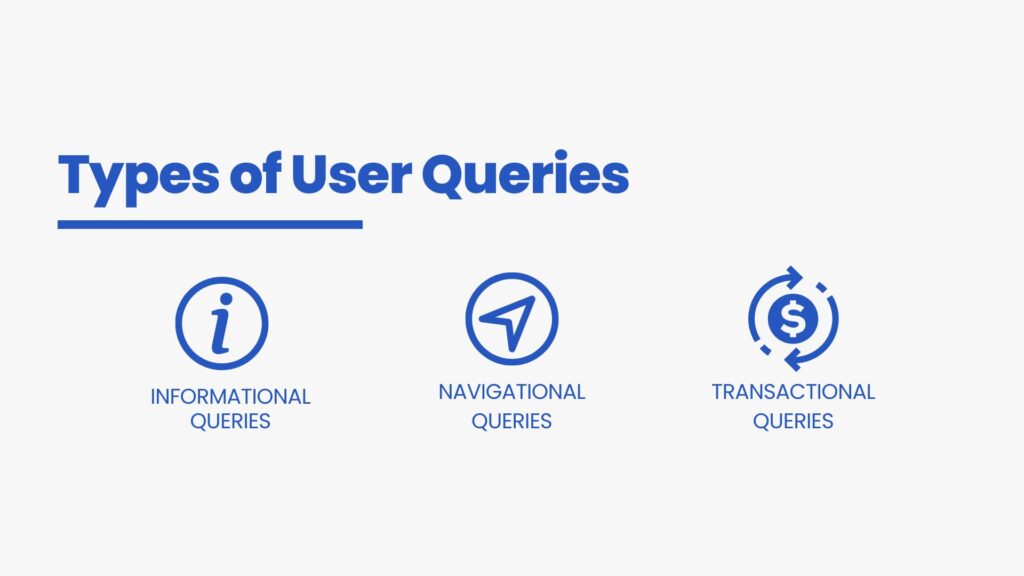
Types of User Queries and Their Role in Off-Page SEO
To optimize your off-page SEO, you need to understand the three main types of user queries and how they influence content and link-building strategies.
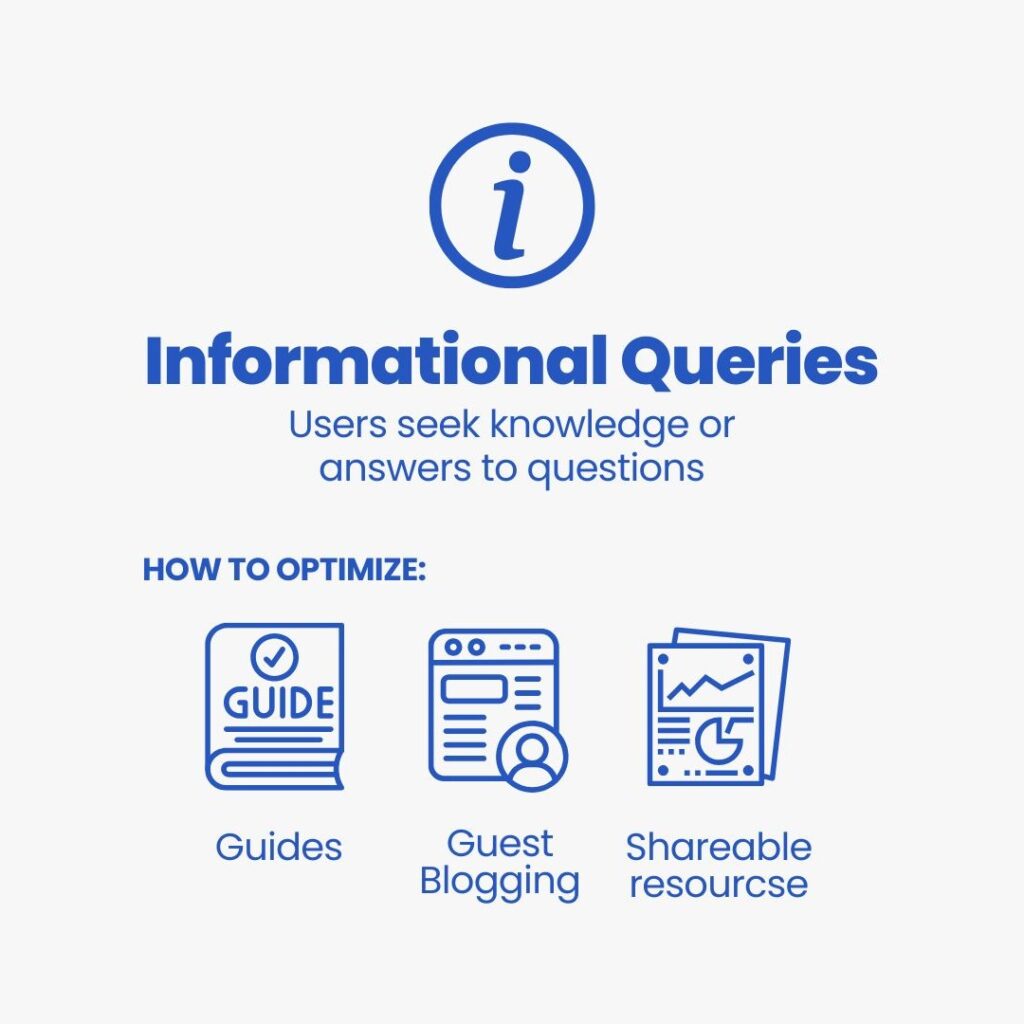
1. Informational Queries
Informational queries seek knowledge or answers to questions. Examples include:
- “Best exercises for weight loss”
- “How does solar power work?”
How to Optimize:
- Create Detailed Guides: Write blog posts, infographics, or videos that answer common informational queries in your niche.
- Guest Blogging: Publish educational content on other websites to establish authority and earn backlinks.
- Shareable Resources: Create content people want to share, like how-to guides or industry reports, to attract backlinks.
2. Navigational Queries
These queries are used when people want to find a specific website, brand, or service. Examples include:
- “Starbucks near me”
- “LinkedIn login”
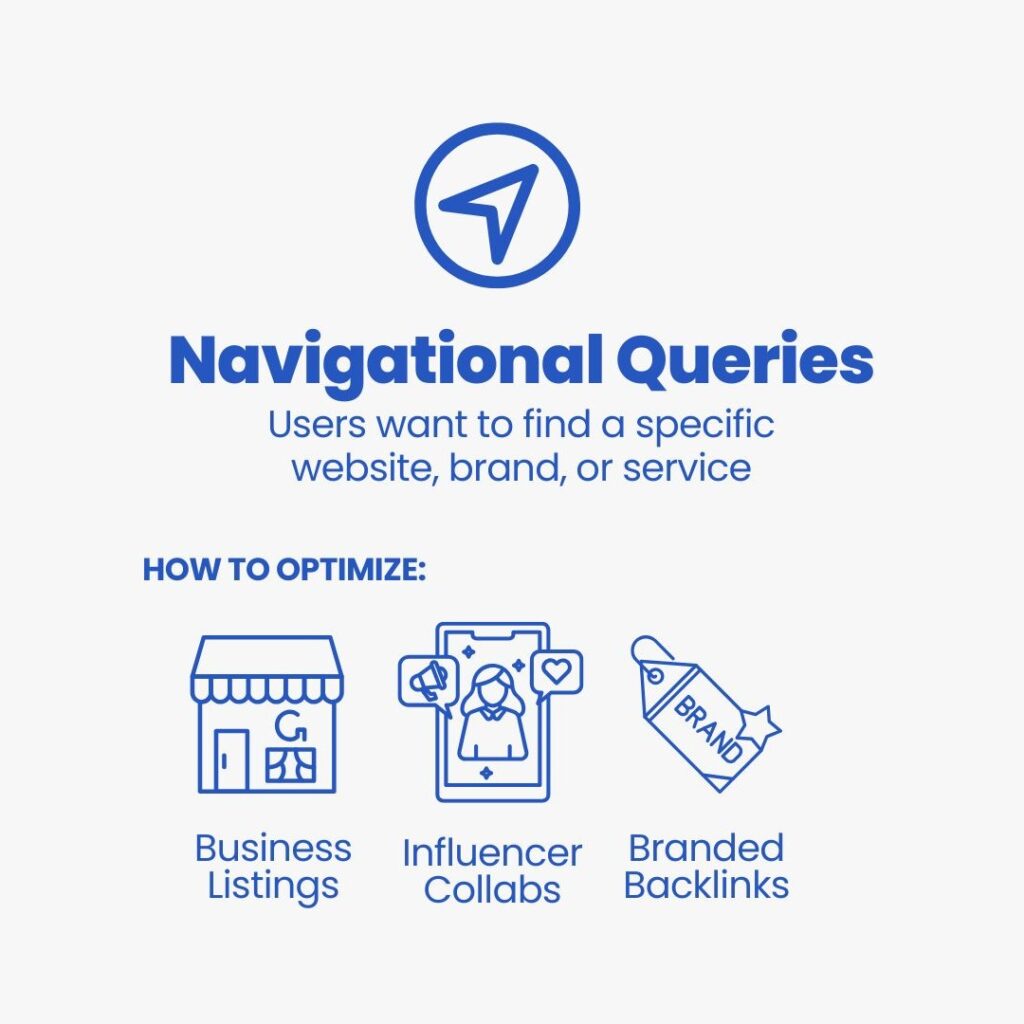
How to Optimize:
- Claim Business Listings: Ensure your brand is listed on platforms like Google My Business and directories to capture navigational traffic.
- Partner with Influencers: Work with influencers or bloggers to mention your brand, creating links and awareness.
- Build Branded Backlinks: Encourage backlinks that include your brand name in the anchor text to improve recognition and authority.
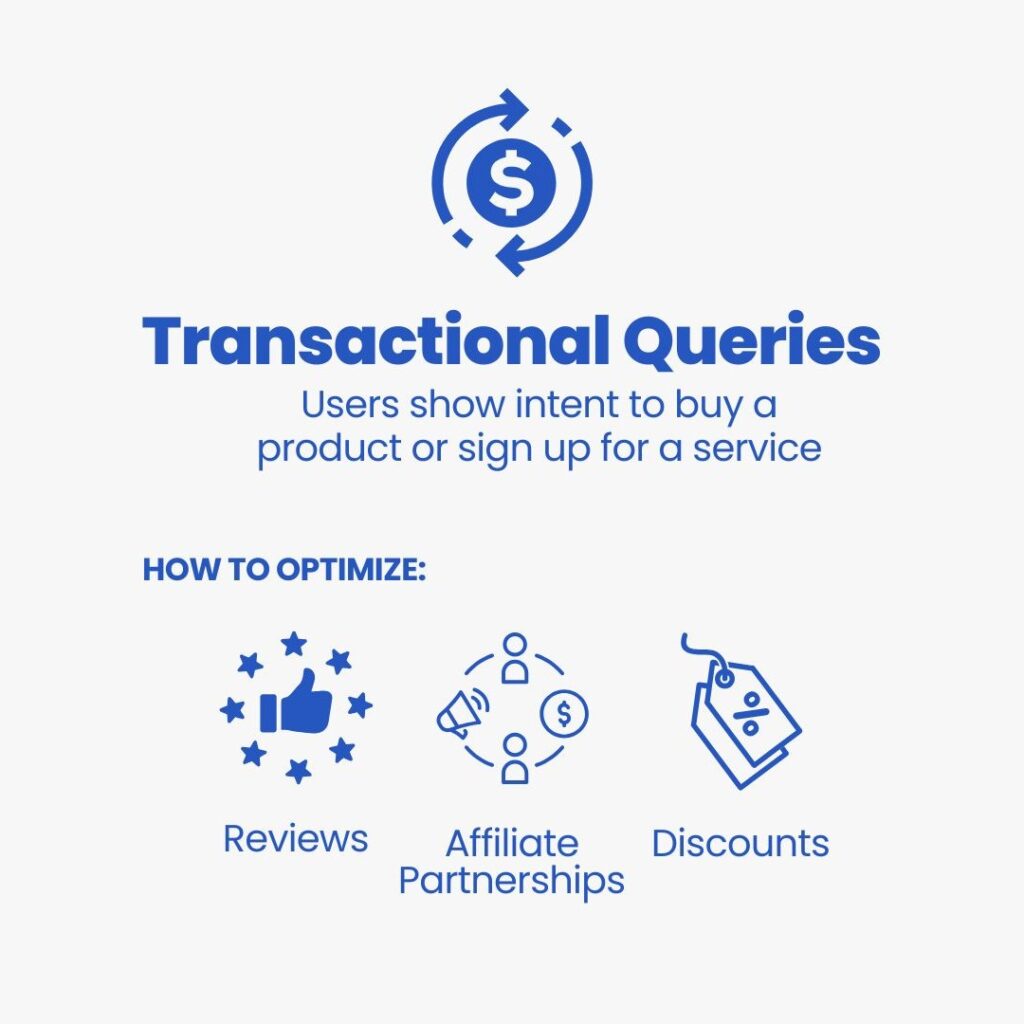
3. Transactional Queries
These queries show intent to take action, such as buying a product or signing up for a service. Examples include:
- “Buy Nike running shoes online”
- “Best deals on smartphones”
How to Optimize:
- Focus on Reviews and Comparisons: Publish content that highlights your product or service as the best choice.
- Affiliate Partnerships: Partner with affiliates to promote your offerings and create backlinks on relevant websites.
- Discounts and Offers: Share deals through third-party websites to drive traffic and gain backlinks.
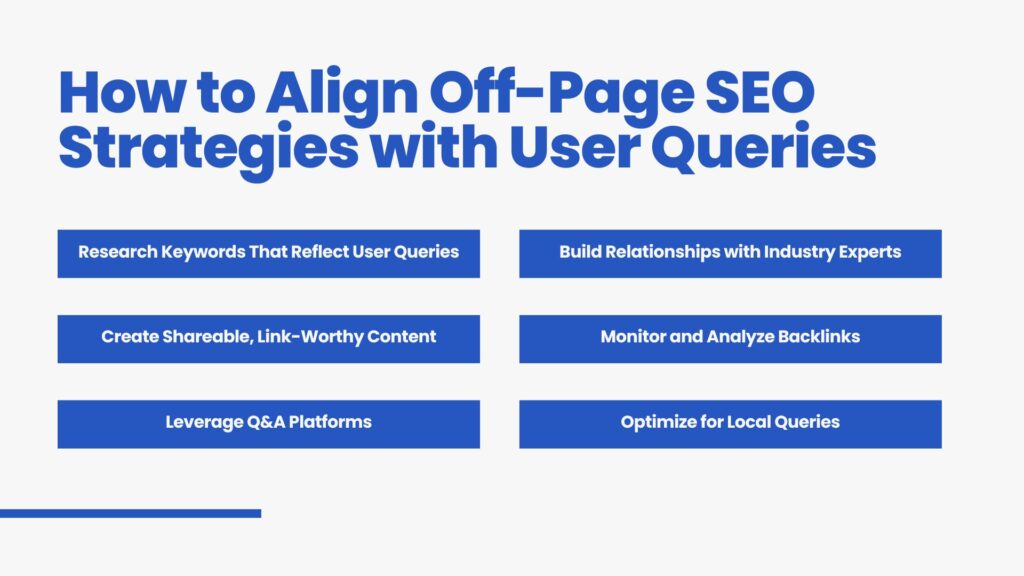
How to Align Off-Page SEO Strategies with User Queries
Understanding user queries is only the first step. Next, you need to align your off-page SEO strategies to meet user intent effectively. Here’s how:
1. Research Keywords That Reflect User Queries
Use tools like Google Keyword Planner, Ahrefs, or SEMrush to discover the terms and phrases people search for in your niche. Pay attention to:
- Long-tail keywords (e.g., “how to start a vegetable garden”).
- Questions and queries with high search volume.
Incorporate these insights into your content and backlink strategies to attract more targeted traffic.
2. Create Shareable, Link-Worthy Content
Content that directly answers user queries is more likely to be shared and linked to. Focus on creating:
- Tutorials and how-to guides.
- Comprehensive lists (e.g., “Top 10…”) or comparisons.
- Data-driven reports and case studies.
Share this content on social media, forums, and communities where your audience is active.
3. Leverage Q&A Platforms
Platforms like Quora, Reddit, and Stack Exchange are goldmines for understanding user queries. Look for questions related to your niche and:
- Provide thoughtful answers with links to your content (where appropriate).
- Identify recurring questions to inspire new content ideas.
4. Build Relationships with Industry Experts
Collaborating with bloggers, influencers, and thought leaders in your industry can help you earn high-quality backlinks. Pitch guest posts or co-create content that align with common user queries to get editorial links.
5. Monitor and Analyze Backlinks
Use tools like Google Search Console or Ahrefs to track your backlink profile. Pay attention to:
- The relevance of anchor text to user queries.
- The quality of websites linking to your content.
- Opportunities to earn more backlinks from related queries.
6. Optimize for Local Queries
If you have a local business, focus on queries with location intent, such as “plumbers near me.” Here’s how:
- Claim and optimize your Google My Business profile.
- Partner with local blogs or websites for local citations.
- Encourage customer reviews to improve visibility and credibility.
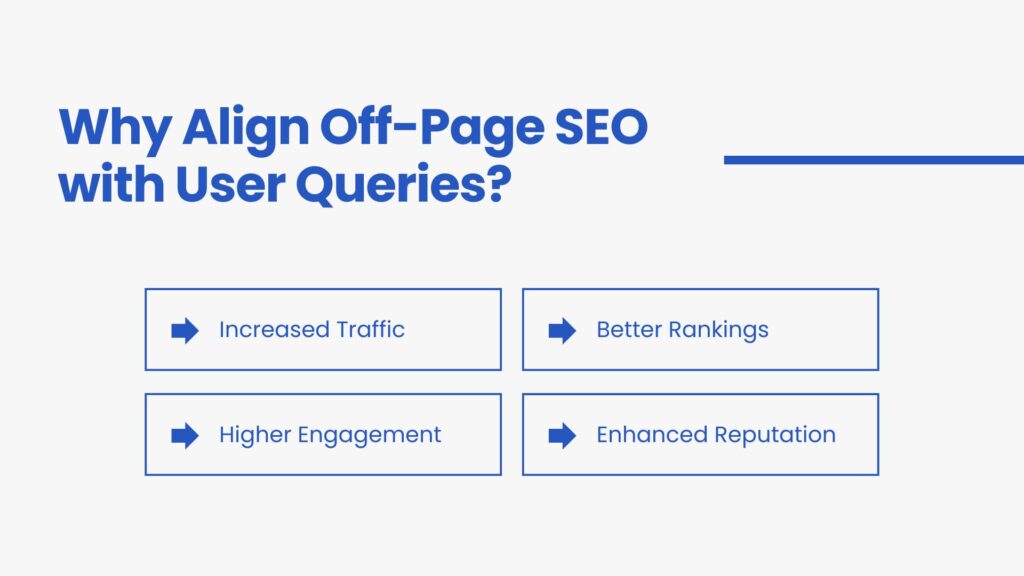
Benefits of Aligning Off-Page SEO with User Queries
Understanding user queries and aligning your off-page SEO efforts can deliver significant benefits, including:
- Increased Traffic: Backlinks aligned with user intent drive relevant visitors to your site.
- Higher Engagement: Content that answers queries keeps users on your site longer.
- Better Rankings: Search engines reward websites that address user intent effectively.
- Enhanced Reputation: Providing value through your content builds trust and credibility.
Conclusion
Off-page SEO is about more than just building links—it’s about creating a strong, trustworthy presence across the web. By understanding user queries and aligning your strategies with their intent, you can improve the quality of your backlinks, drive more targeted traffic, and ultimately boost your search engine rankings.
Start by researching the questions your audience is asking, creating content that answers those questions, and building relationships with the right people to amplify your efforts. With a focus on user intent, your off-page SEO strategy will be more effective and impactful than ever before.
Understanding what your audience is searching for is the key to effective SEO—and Link Genius can help you capitalize on it. Our platform connects you to relevant backlink opportunities tailored to the questions and needs of your target audience.
Build high-quality backlinks and reach the right audience today.
